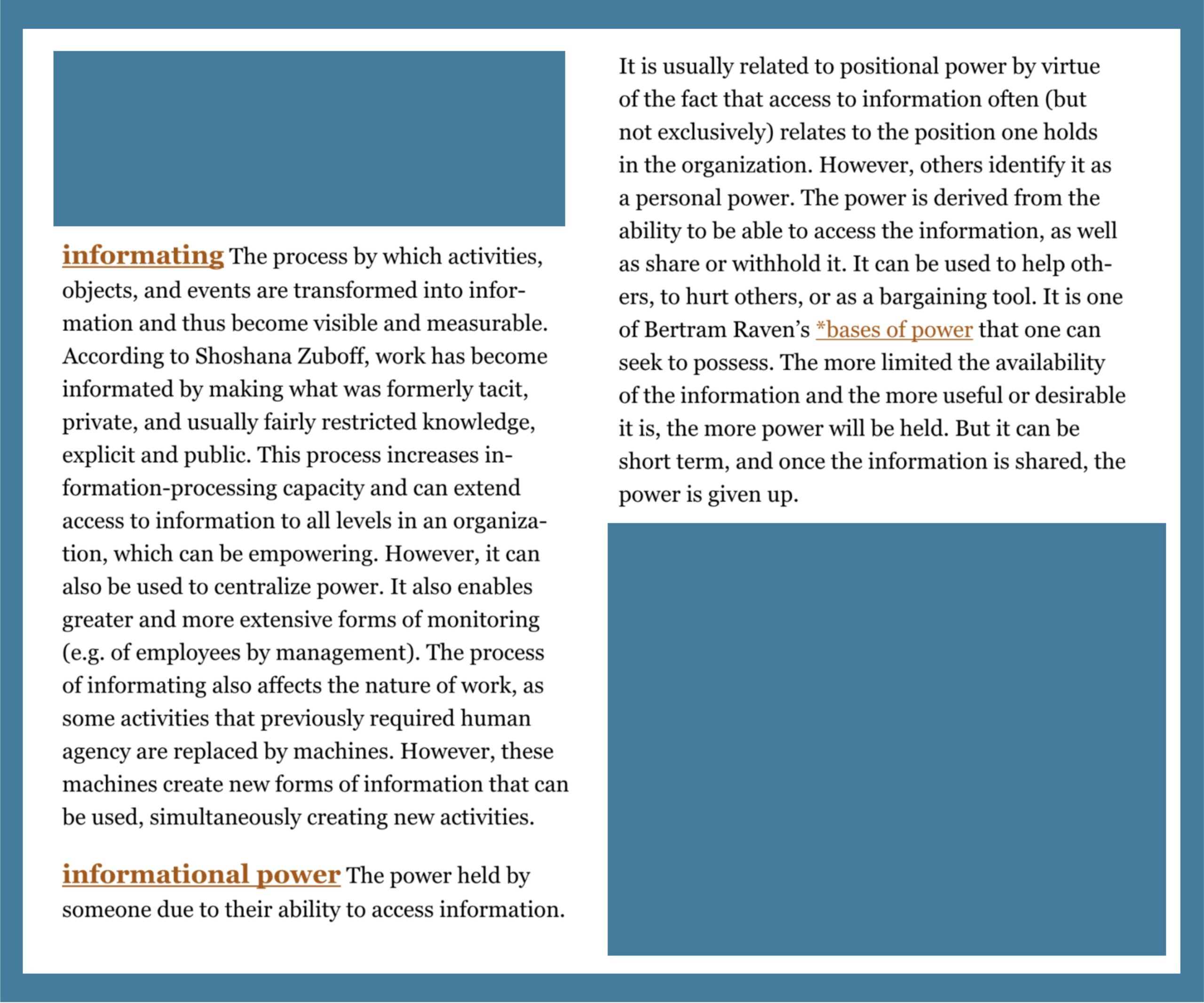Graeme Johnston / 30 January 2023
Informating …[A]ctivities… are transformed into information and thus become visible and measurable… [This] can be empowering. However, it can also be used to centralize power… [to] enable… monitoring… and [to replace people] by machines. However, these machines create new forms of information that can be used, simultaneously creating new activities… Informational power. The power held by someone due to their ability to access information… as well as share or withhold it. It can be used to help others, to hurt others, or as a bargaining tool.
These definitions come from Emma Jeanes’ excellent, succinct, subtly pointed Oxford Dictionary of Organizational Behaviour (2019).
I imagine that these tensions will be recognised by most of us.
The exercise of informational power must be as old as organisations. Sometimes it just exists, passively: sharing information has always required some positive effort. But often it’s deliberate. Reasons abound: a hundred variations on the information’s sensitivity, or that it requires skilled handling or is private. Sometimes justified. But easily confused with more selfish motivations, conscious or not.
The costs are also well-known. The most obvious is that squirrelling information enables bad stuff to be hidden. But failing to share relevant information can contribute to wider problems such as disempowerment, cronyism, inefficiency and failure to develop.
In contrast, it can be really empowering, in ways that go beyond usefulness, to see what’s going on. The artist Paul Klee defined his work as making visible.
But it’s always been scary when all that is solid threatens to melt into air (as some mid-nineteenth century theorists put it, writing about the ‘constant revolutionising of production.’)
In my opinion, some types of automated ’employee monitoring systems’ already go too far. But how about cases in which the objection is not ‘invasion of privacy’ or direct ‘oppression of individuals’ but more along the lines of ‘business sensitivity’ or ‘leave it to the pros to handle’? It’s not easy because, even without the more intrusive forms of individual monitoring, the dividing line between legitimate and harmful ‘accountability’ is complex and contestable.
In legal work, for example, it is not typical yet to automatically monitor workers’ activities as extensively as in some ‘blue collar’ and IT outsourcing jobs, but the stress of having to account for time precisely and meet hour-based, bill-based or other highly individualised targets is well-known.
We can’t tell exactly yet how the cycles described by Jeanes will play out in the coming decades (and beyond), for us individually and for our organisations and societies more generally. The future isn’t fixed. But some of the possibilities are apparent.
In so far as you think that the direction of travel in your organisation – or organisations generally – is going to be towards greater transparency, a big question is what to do now.
When I was discussing this with someone in a law firm the other day, we reckoned that there were three basic attitudes for the individual and the organisation:
- Resist with exceptions
- React issue-by-issue
- Embrace with exceptions
In theory, they may come to the same thing substantively (depending on the exceptions). But the attitude is quite different.
- The attraction of 1 is obvious if you think that the direction of travel is wrong, or contains wrong elements.
- 2 is also attractive as a way of not having to think about it too much, when we have so much else on.
The trouble with those two options is that you risk not influencing what kind of transparency we end up with as dominant. And there are a thousand nuances there.
My personal choice – as reflected in what I’m doing at Juralio, noslegal and in various other ways – is option 3 because I think
- that’s where we’re broadly heading anyway, in business and society
- it has many good elements – for example, in law I think it can ultimately empower those who need to be better served, but also individuals providing legal services and, if they approach the topic skilfully, their existing organisations
- it also has some real dangers, which are better faced than ignored
In short, I’d prefer to influence it in what small ways I can, so that we get more of the good than the bad. And I think it’s better to do so by embracing the flow towards greater transparency.
That’s part of the answer to the question I’m sometimes asked about why I’m doing what I do. In my day job (Juralio), in side-projects like noslegal (information structures) and in various other information-related causes which I try to support in various ways, such as open source, anti-SLAPP, privacy and certain types of knowledge-sharing.
To give just one example, Juralio’s emphasis on making it possible for everyone to engage with legal matters, and see what’s going on, at modest effort is a very different vision from more top-down, Taylorian ideas of process.
These are exciting-scary-difficult issues and we each need to find our own positions on them.
And although technology is relevant, all sorts of deep human, cultural and system issues arise.
The point is this: the less we tackle these things thoughtfully and proactively, the more we will be at risk of ending up with reduced, unhappier options later. As some late twentieth century voices put it:
The money feels good
And your life, you like it well
But surely your time will come
As in Heaven, as in Hell

